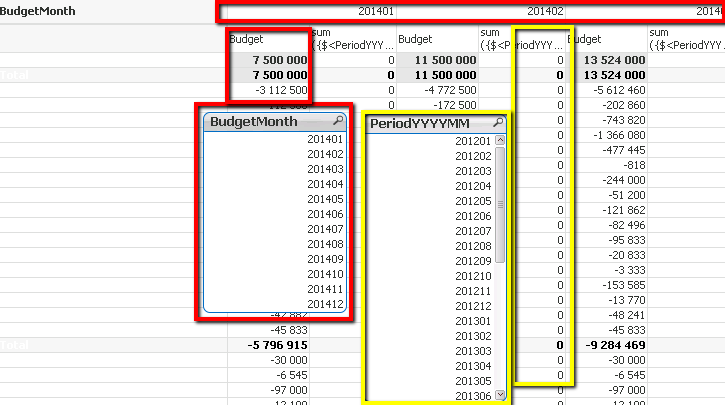Unlock a world of possibilities! Login now and discover the exclusive benefits awaiting you.
- Qlik Community
- :
- All Forums
- :
- QlikView App Dev
- :
- Set Analysis
- Subscribe to RSS Feed
- Mark Topic as New
- Mark Topic as Read
- Float this Topic for Current User
- Bookmark
- Subscribe
- Mute
- Printer Friendly Page
- Mark as New
- Bookmark
- Subscribe
- Mute
- Subscribe to RSS Feed
- Permalink
- Report Inappropriate Content
Set Analysis
Hi I have this problem.
I have Budget and Invoiced. In my model these are NOT concatenated into the same table and they wont be.
So I´m looking for a set Analys to find a solution for this. I need that PeriodYYYYMM "knows" that it should be the same as in BudgetMonth for all BudgetMonth. sum({$<PeriodYYYYMM={"$(=(BudgetMonth))"}>}[Recorded amount]) is my expression.
If I select one BudgetMonth it will works but I want to se all Month.
These 2 fields dont have any connection to each other, both are comming from dimension tables in my model.

- Mark as New
- Bookmark
- Subscribe
- Mute
- Subscribe to RSS Feed
- Permalink
- Report Inappropriate Content
Can you please share your sample data file in probably excel format with reduced data....?
- Mark as New
- Bookmark
- Subscribe
- Mute
- Subscribe to RSS Feed
- Permalink
- Report Inappropriate Content
HI ONCE TRY WITH
sum({$<PeriodYYYYMM={"$(=MAX(BudgetMonth))"}>}
- Mark as New
- Bookmark
- Subscribe
- Mute
- Subscribe to RSS Feed
- Permalink
- Report Inappropriate Content
Hi,
works only if a select one month at the time. if I dont do any selection it will gives me 201412, not correct.
- Mark as New
- Bookmark
- Subscribe
- Mute
- Subscribe to RSS Feed
- Permalink
- Report Inappropriate Content
You need to use the =concat() function in order to create a string which includes all months to display. This you can then put into set analysis.
Something like:
sum({$<PeriodYYYYMM={"$(=Concat(distinct BudgetMonth,','))"}>}
Play around with the syntax first, though, since I'm not sure the above will work straight away.
- Mark as New
- Bookmark
- Subscribe
- Mute
- Subscribe to RSS Feed
- Permalink
- Report Inappropriate Content
Looking at the data model I think Martin Mahler solution will work.
Why not just create a field PeriodYYYYMM in Budgets with the same value as BudgetMonth and created a link?
You could also try =sum({$<PeriodYYYYMM=BudgetMonth}> } [Recorded amount] )
Richard
QlikCentral.Com
- Mark as New
- Bookmark
- Subscribe
- Mute
- Subscribe to RSS Feed
- Permalink
- Report Inappropriate Content
Hi,
Yes I have test this, concat will gives me ALL (the total) of Invoiced in every BudgetMonth field.
I still need to aggregate this value down to Month level.
- Mark as New
- Bookmark
- Subscribe
- Mute
- Subscribe to RSS Feed
- Permalink
- Report Inappropriate Content
Consider using a date island.
In a date island you have an unrelated calendar with all possible dates between a start and end date.
A selection from a date island dimension is passed to the expression with set analysis, like:
sum( {<Budgetdate={">=$(=min(DateIslandID))<=$(=max(DateIslandID))"}>}amount)
sum( {<Actualdate={">=$(=min(DateIslandID))<=$(=max(DateIslandID))"}>}amount)
// Load the Date Island
Let vStartDate=Floor(MakeDate(1921));
//Let vEndDate=Floor(MakeDate(2014,12,31));
let vEndDate = Floor(YearEnd(today()));
Let vDiff=vEndDate-vStartDate+1;
DateIsland:
Load
date(TempDate) as DateIslandID,
class(Year(TempDate), 10) As Jaar_groep,
Year(TempDate) as Jaar,
Year2Date(TempDate, 0, 1) as CurrentYtd,
num(Month(TempDate)) As Maandnr,
week(TempDate) as Week,
ceil(month(TempDate)/3) as Kwartaalnr;
Load
$(vStartDate)+RecNo()-1 As TempDate
AutoGenerate($(vDiff));